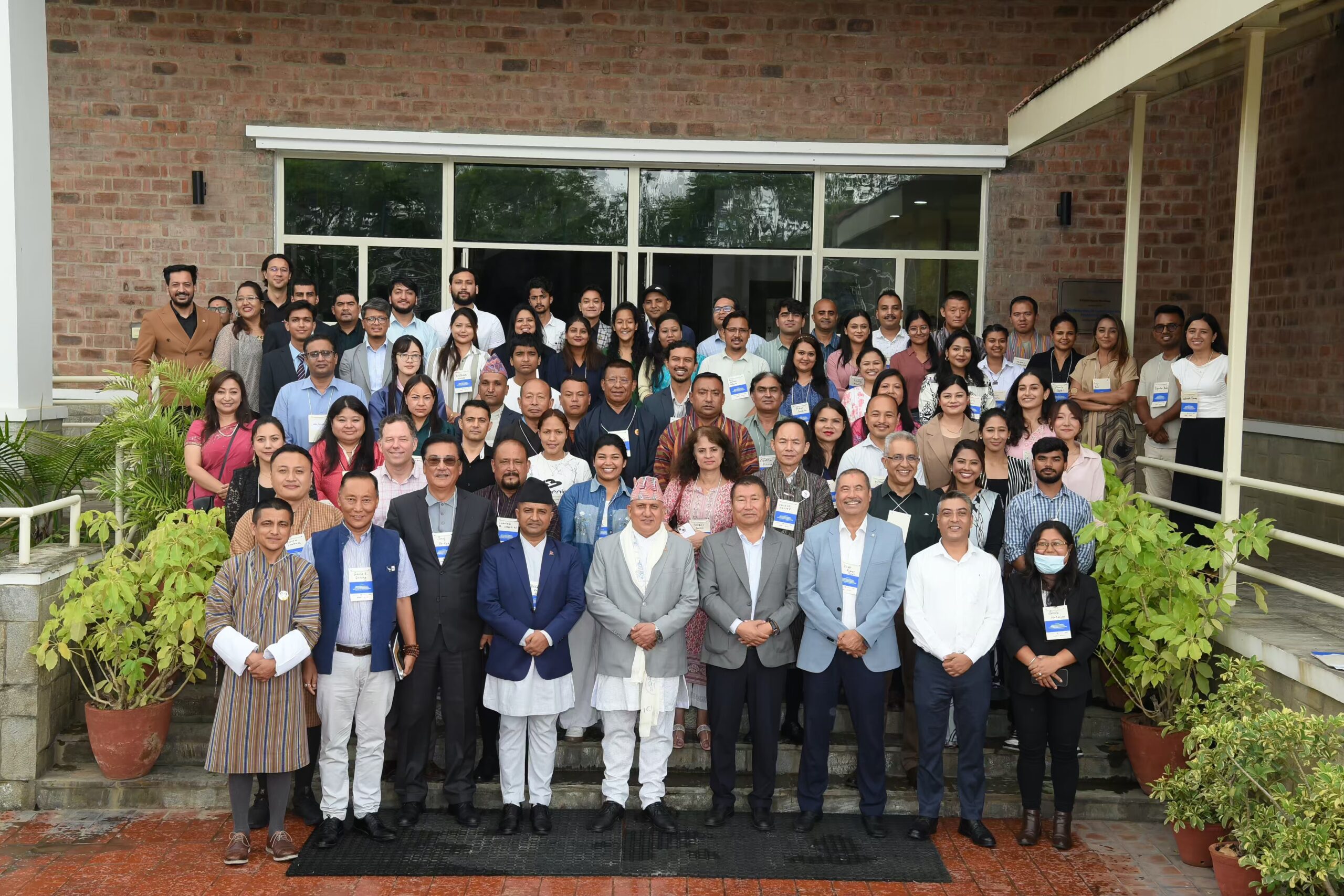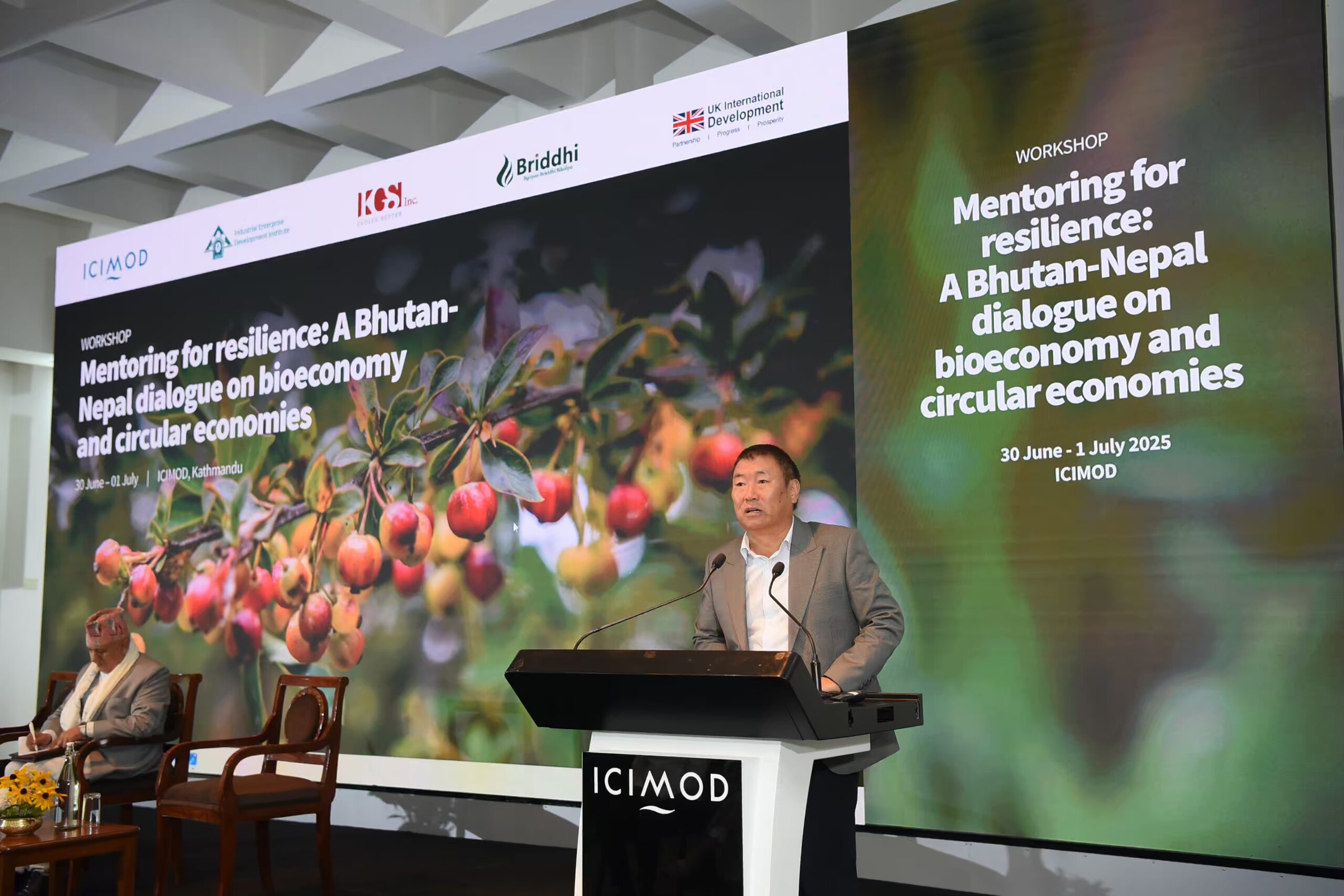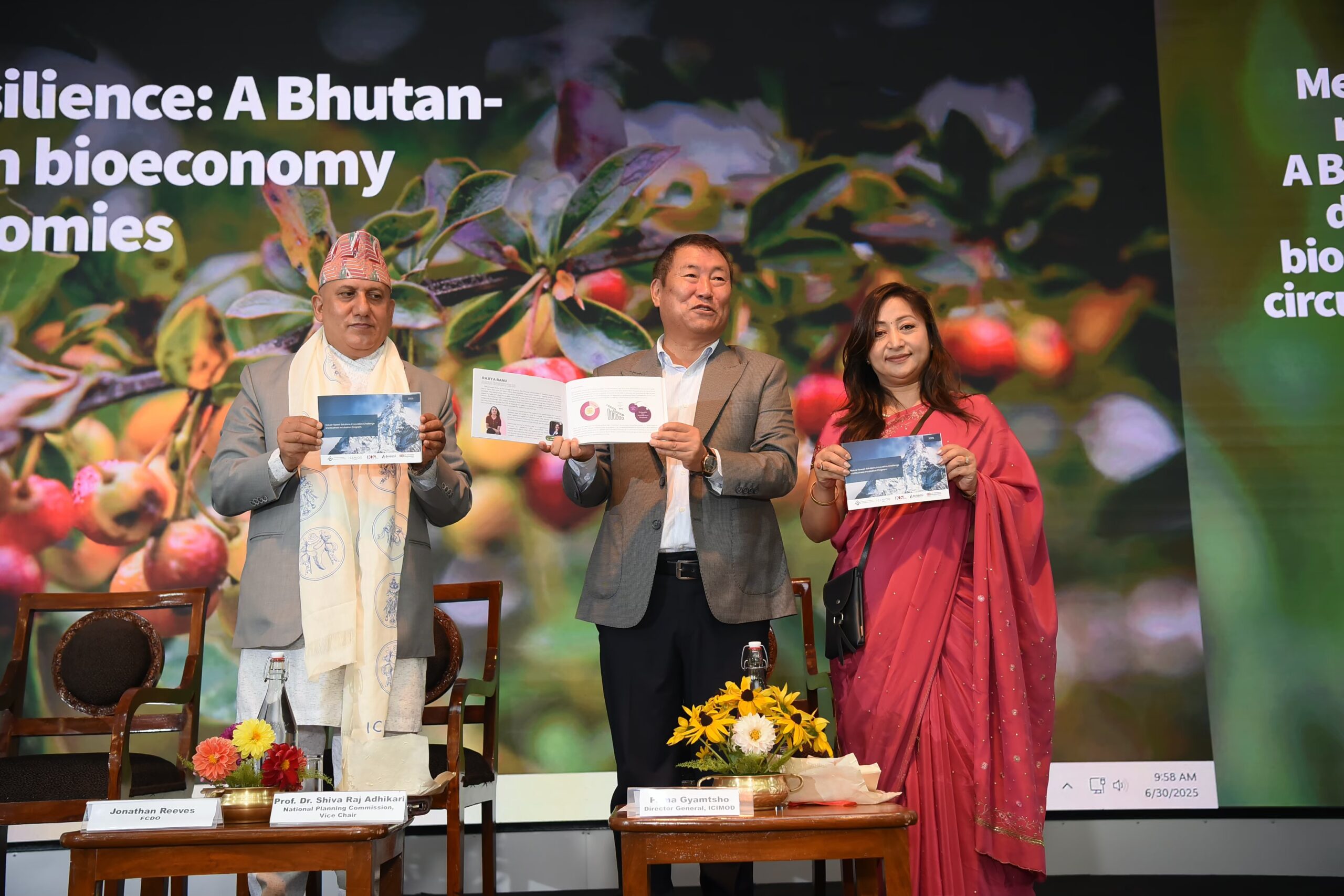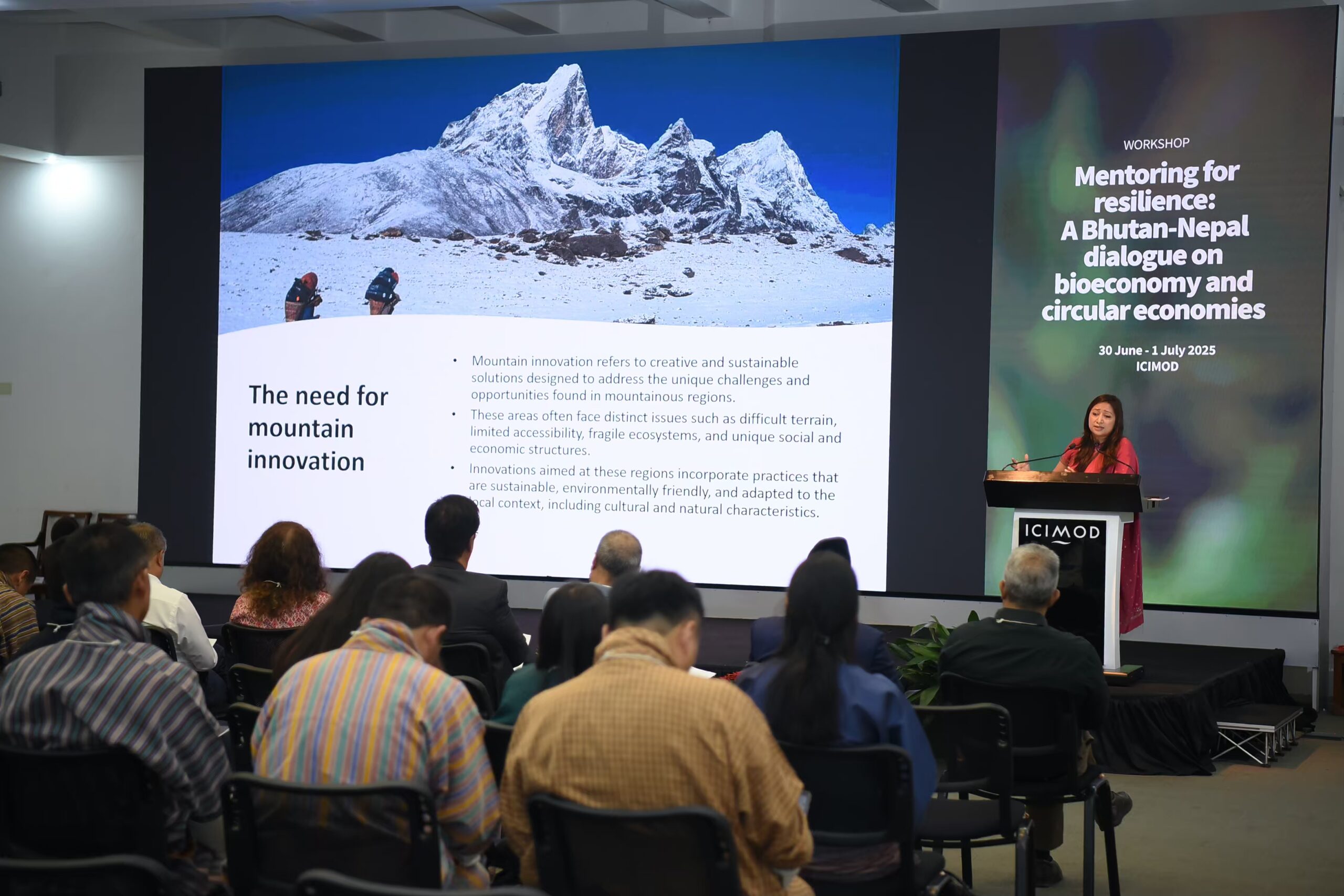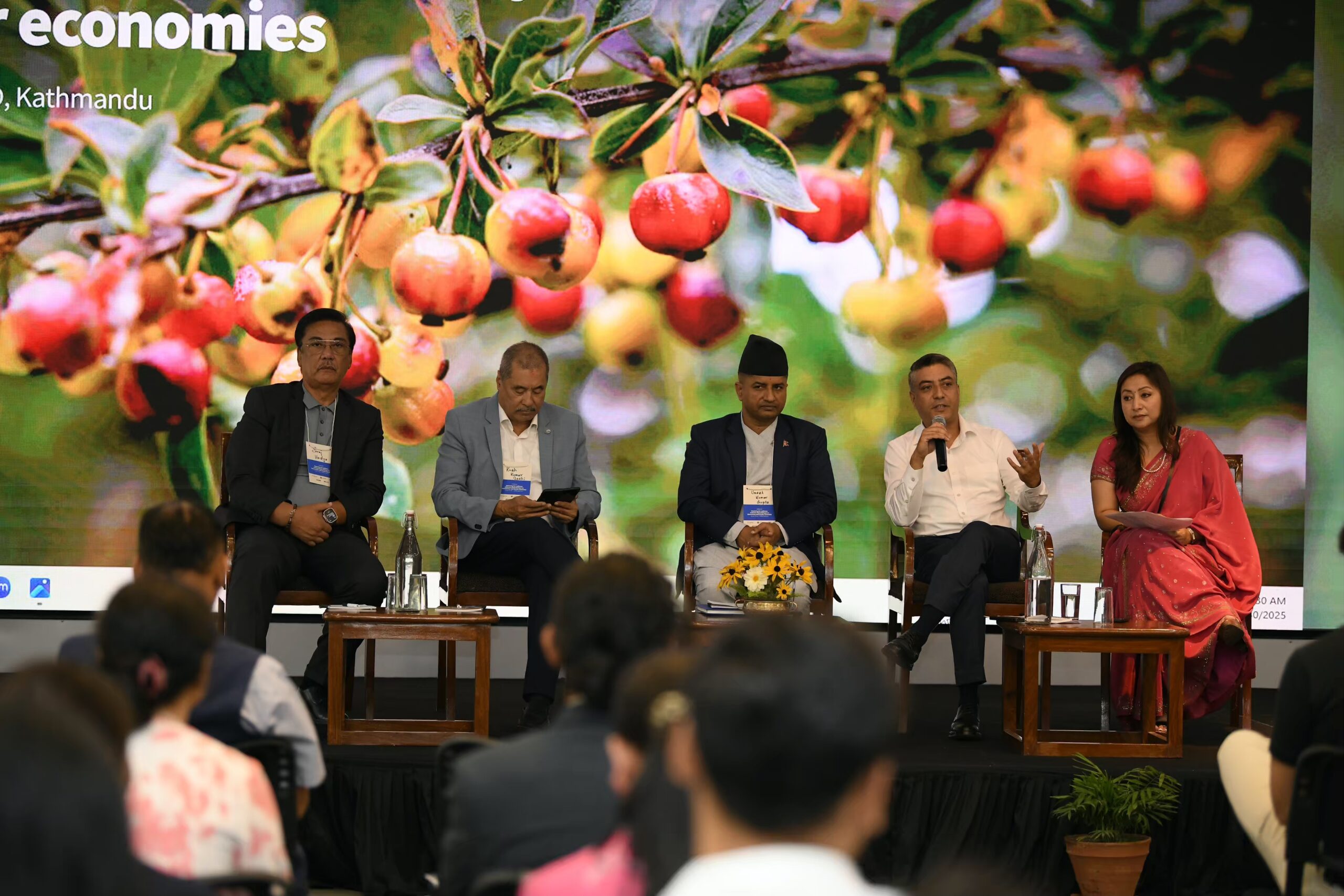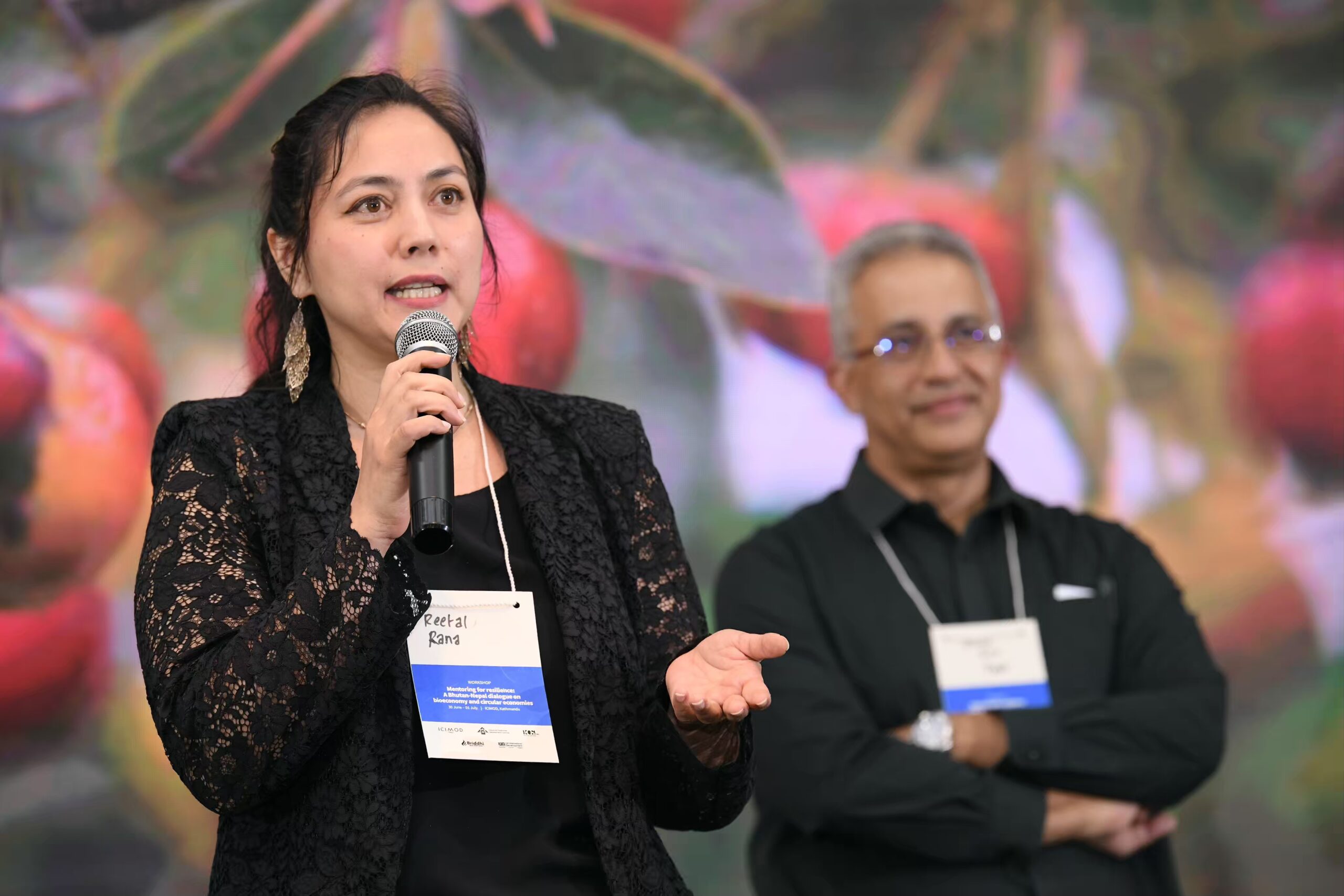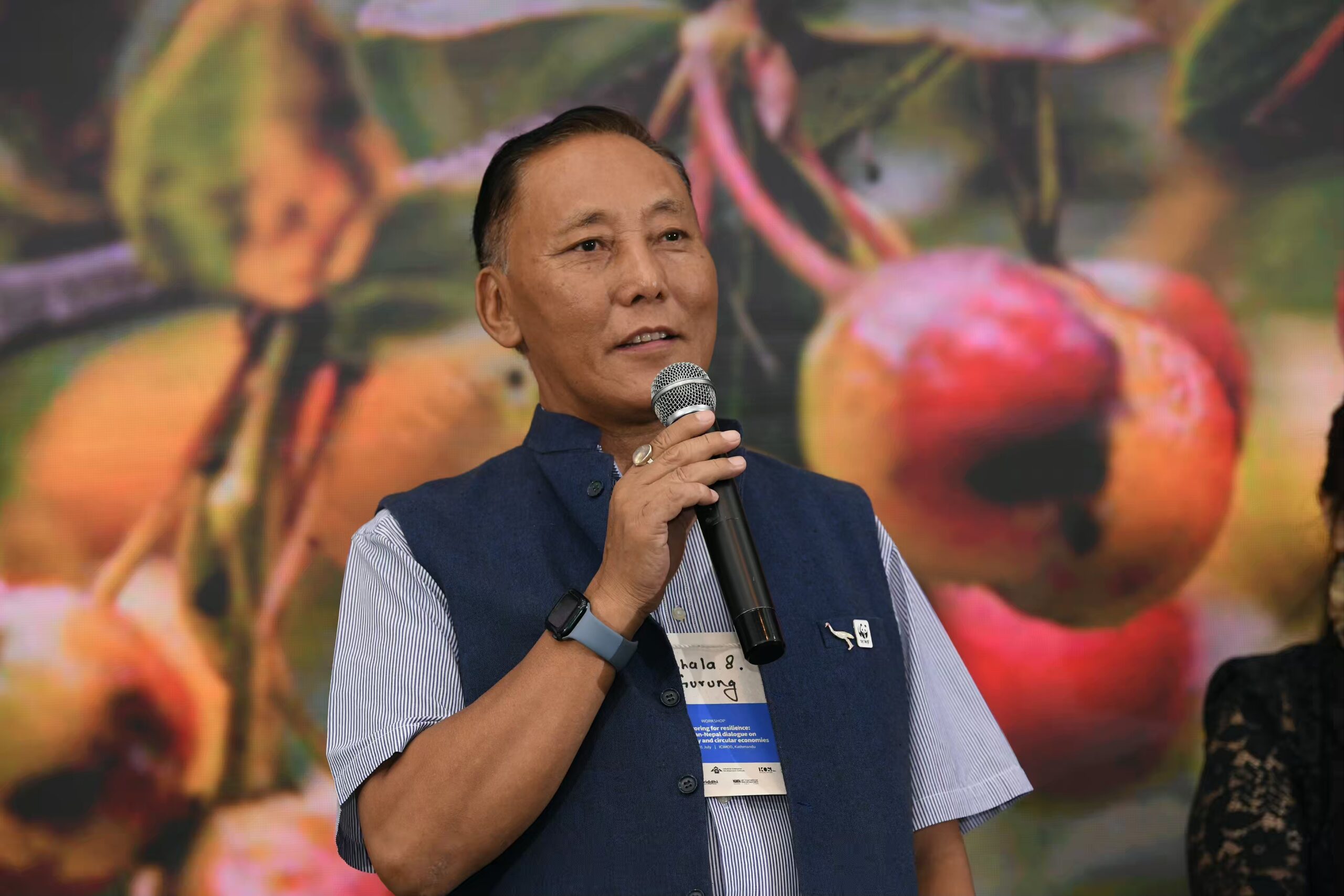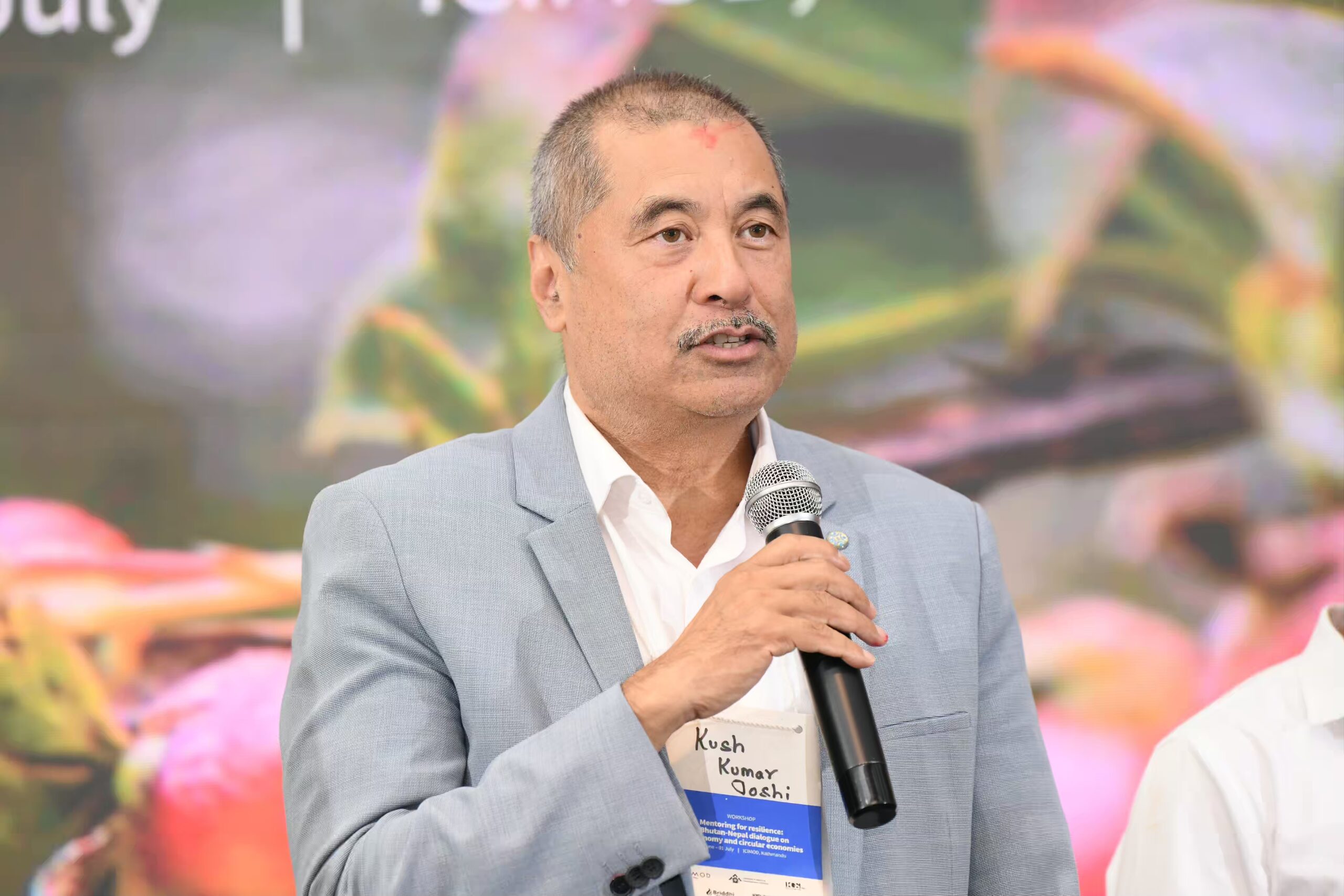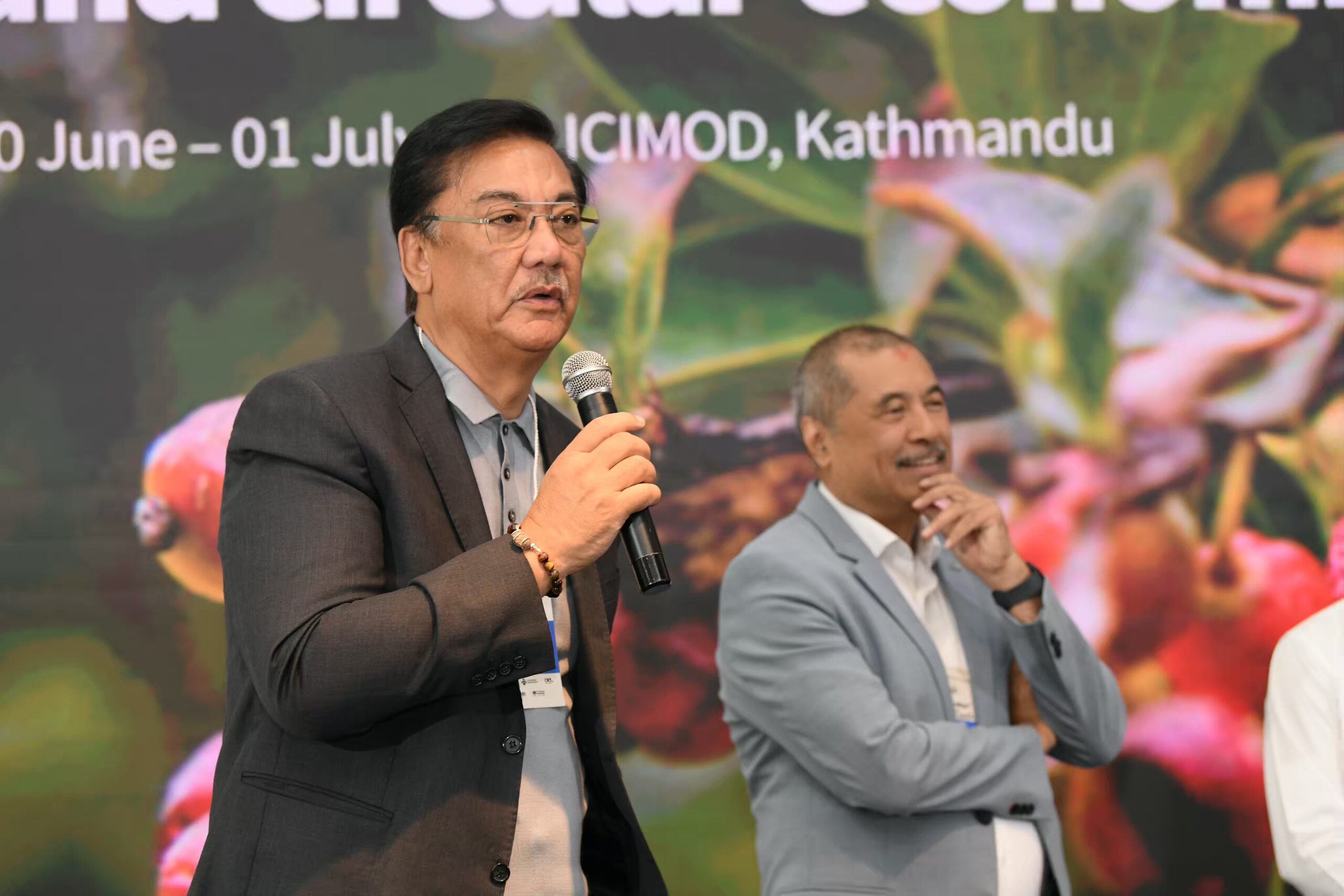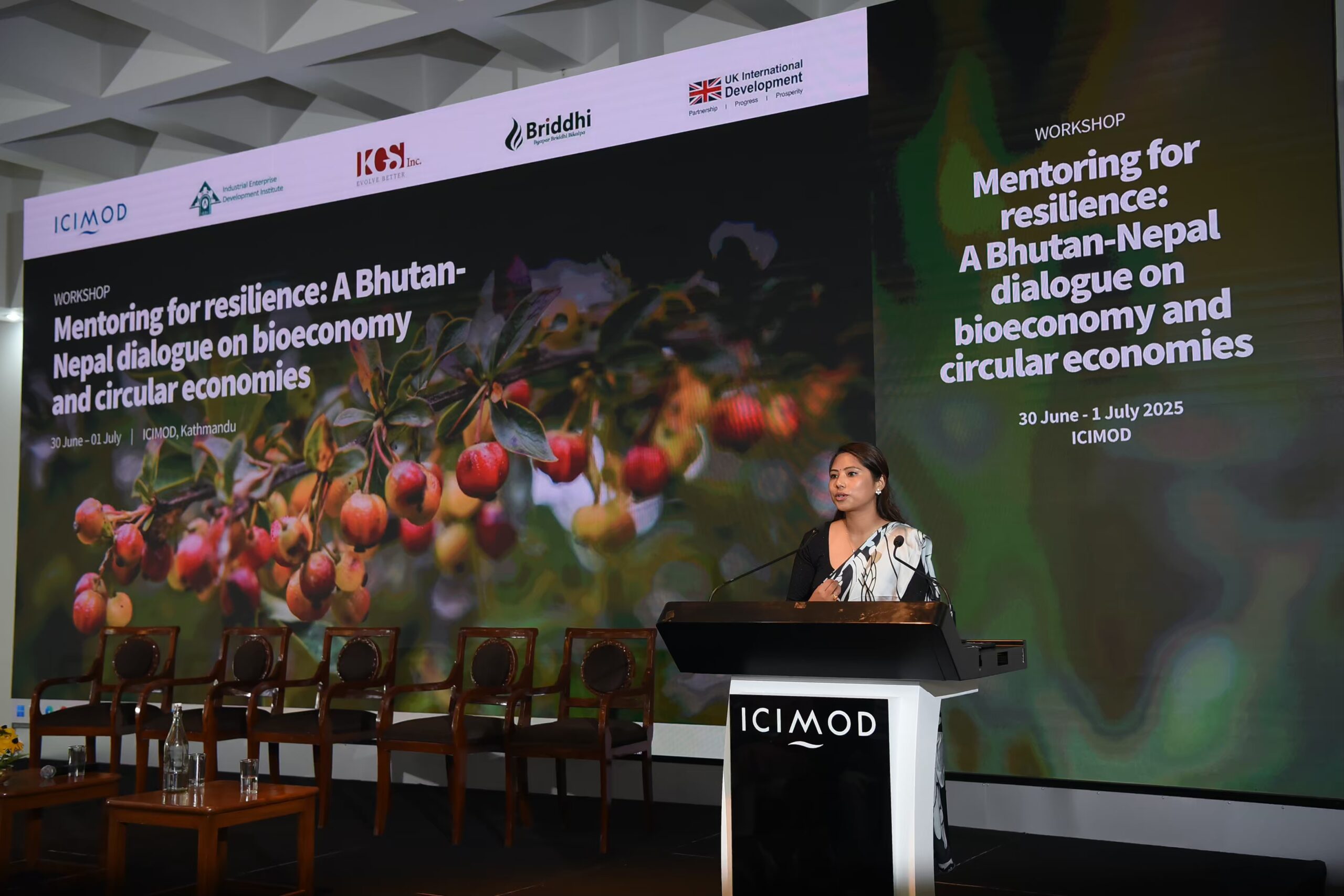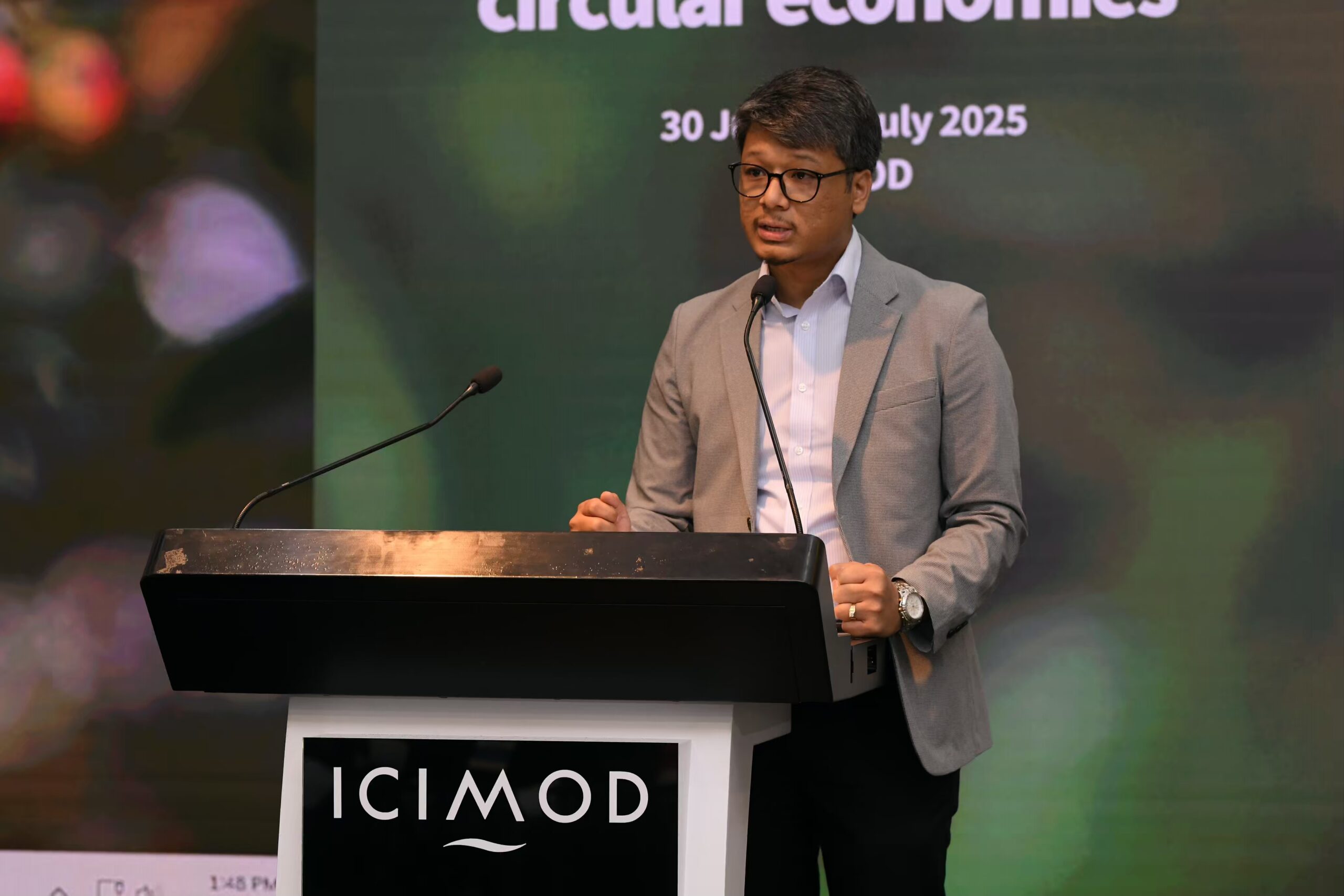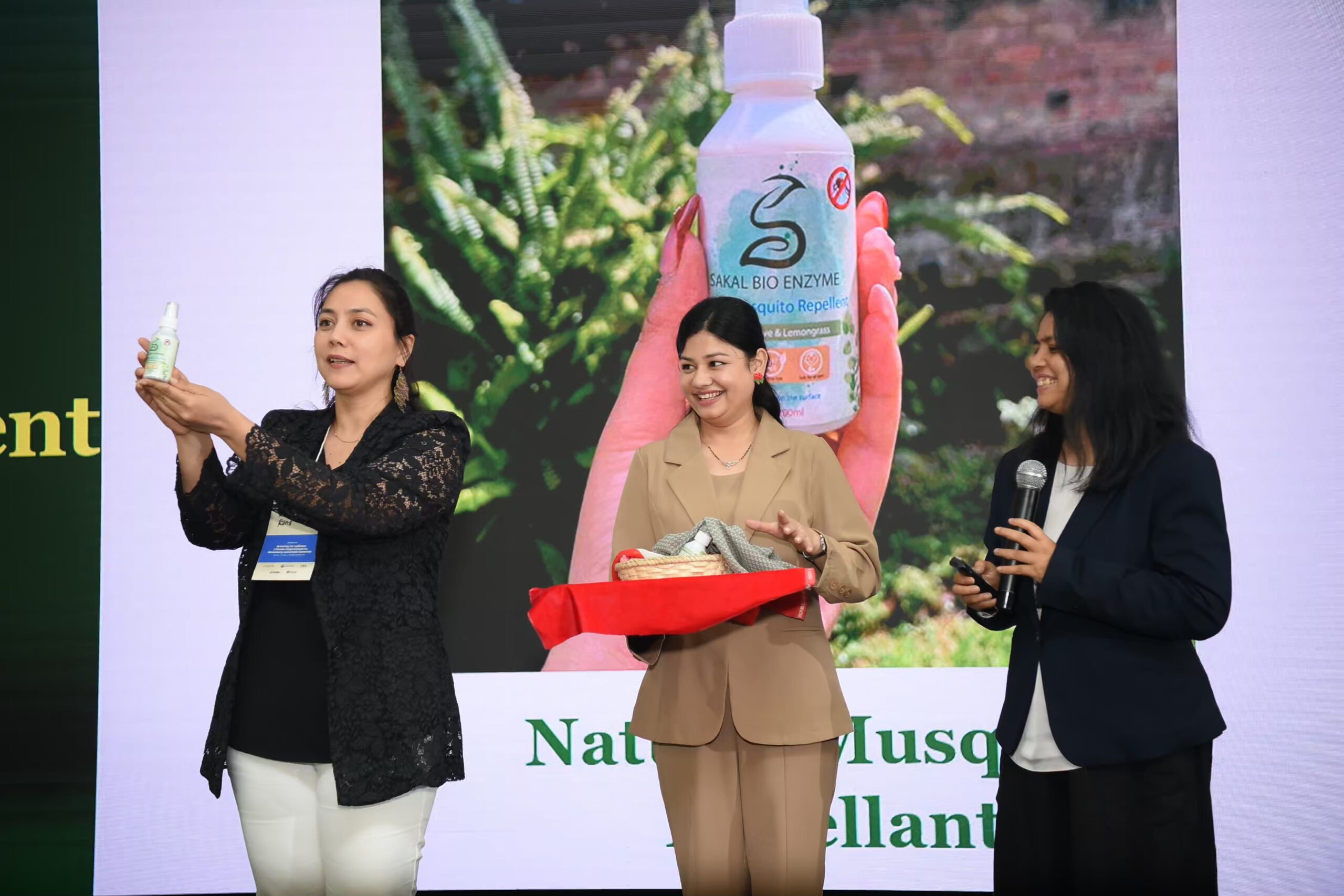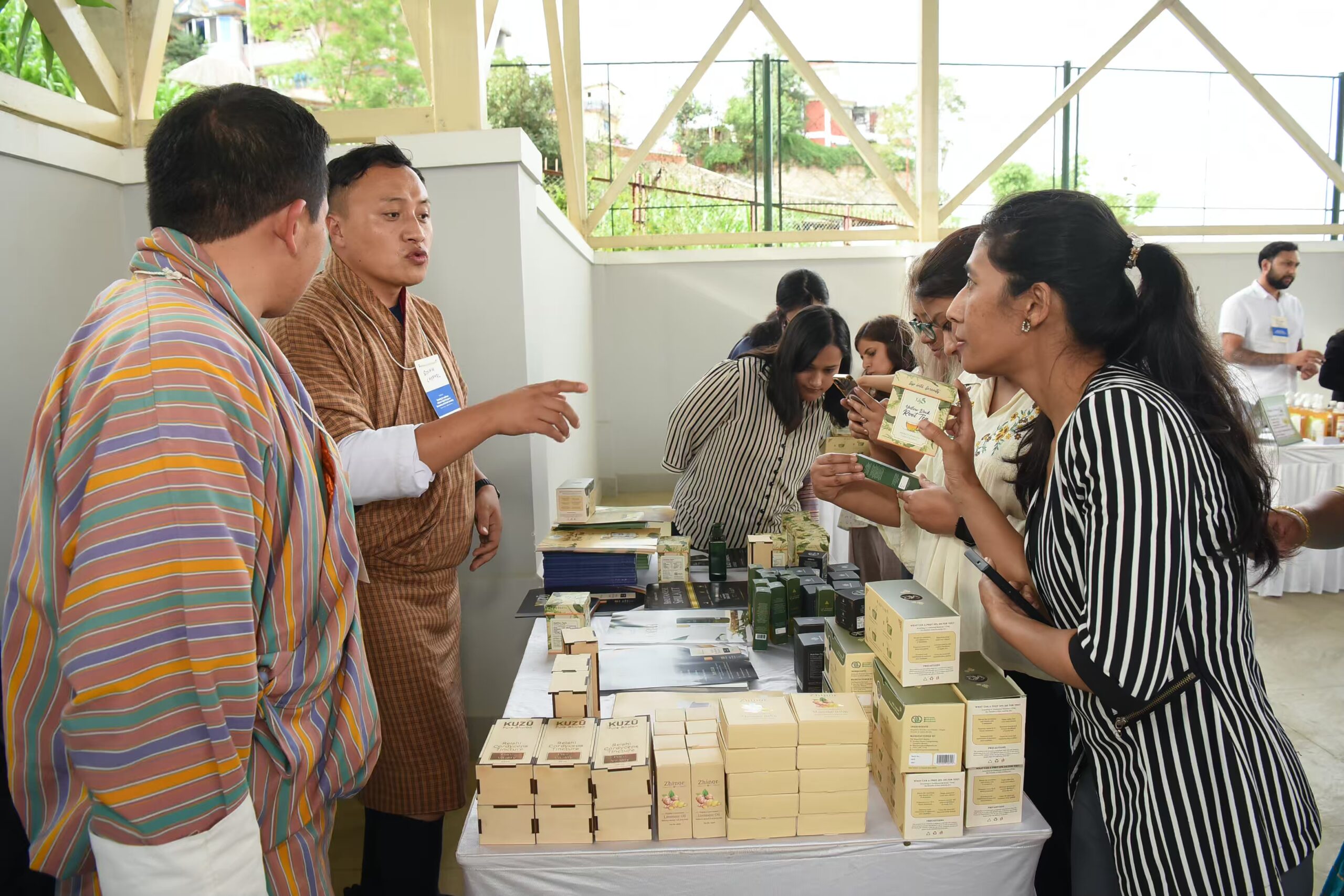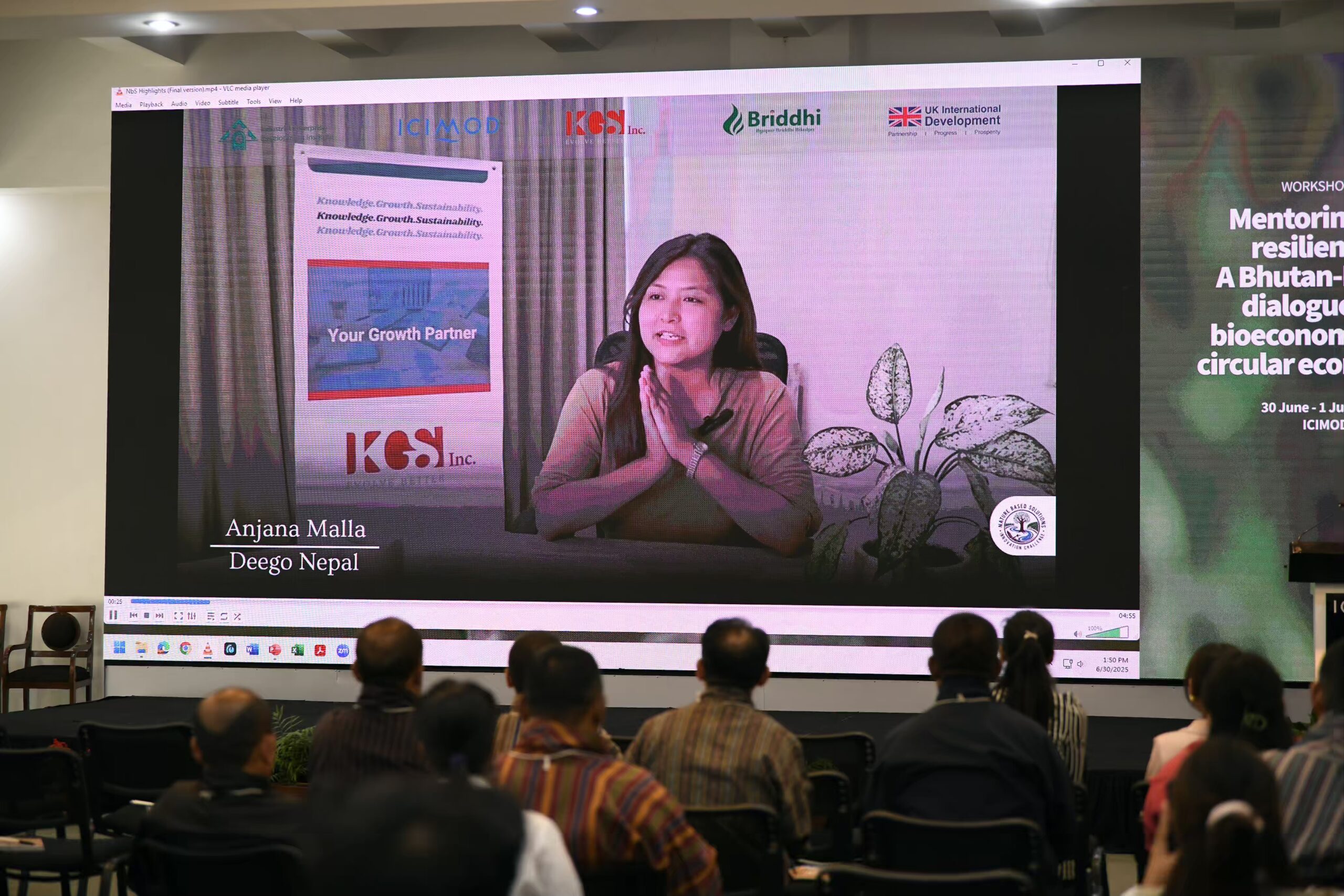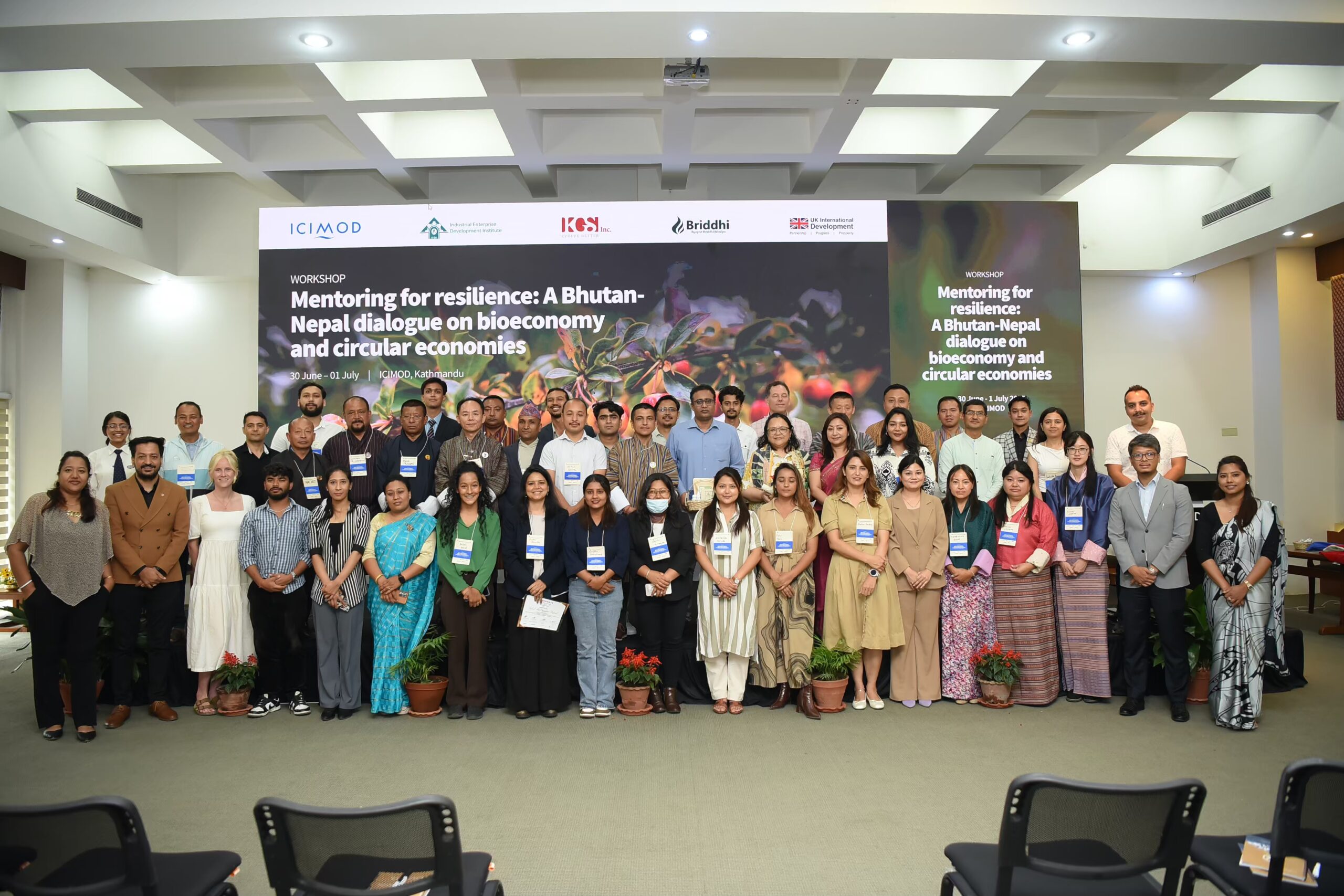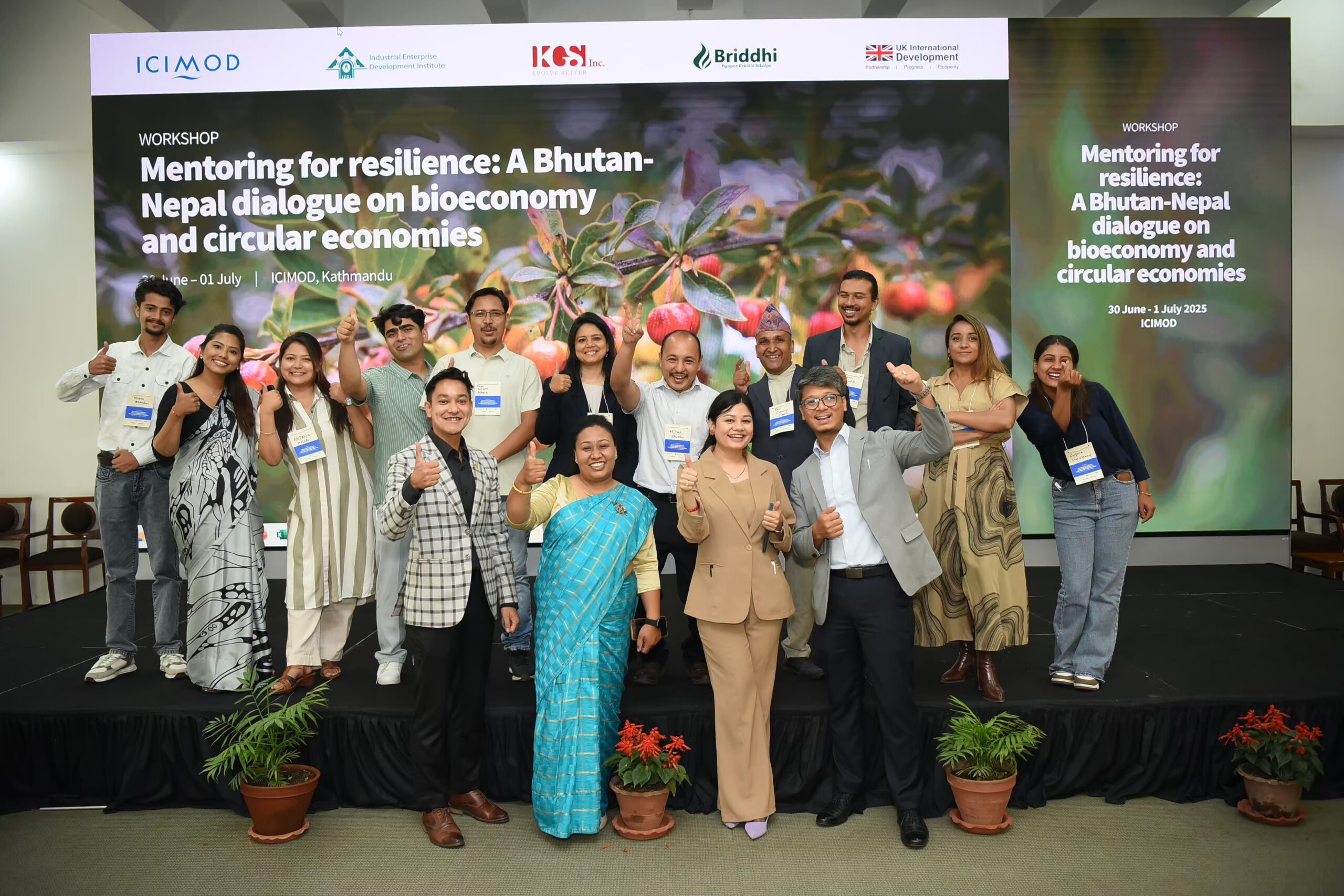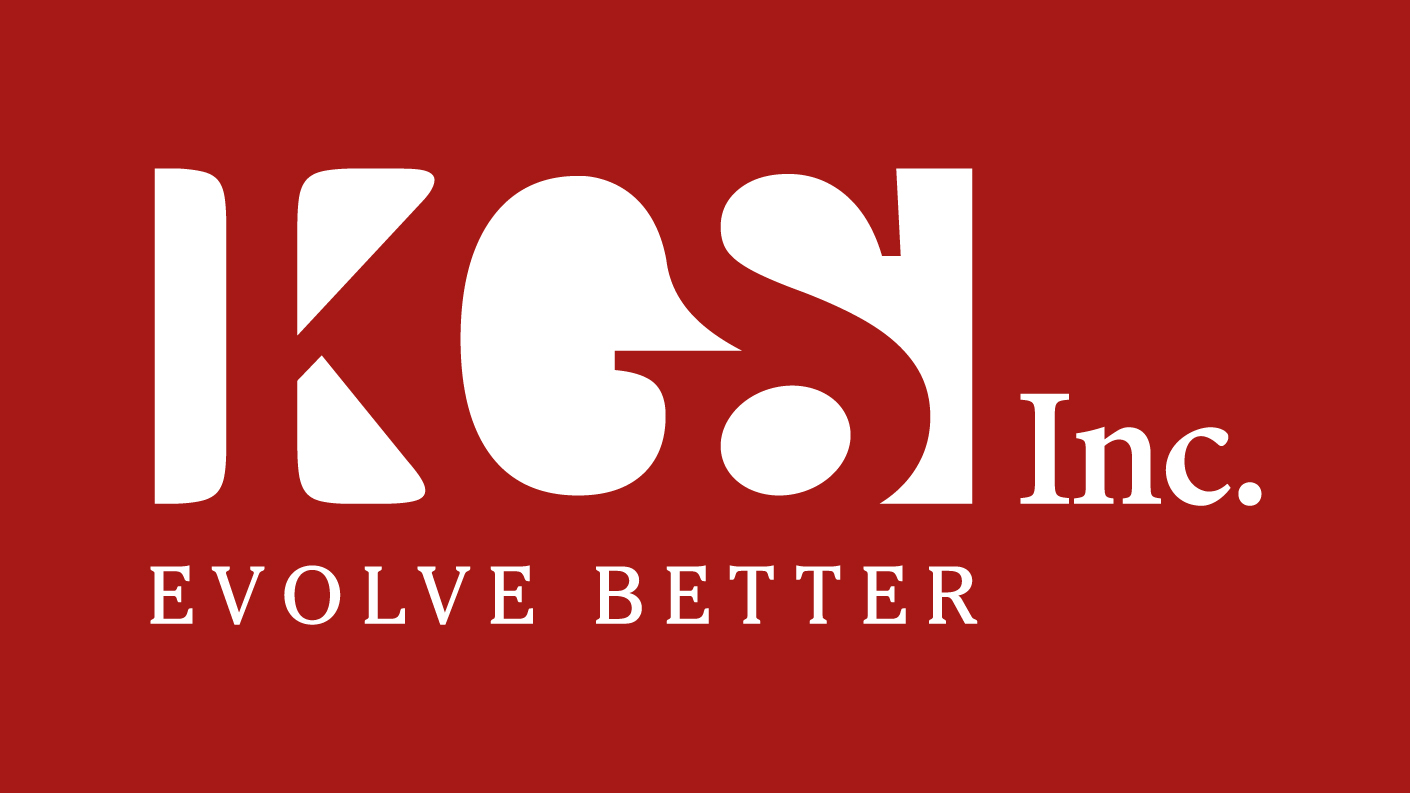Mentoring for Resilience
A Bhutan-Nepal Dialogue on bioeconomy and circular economies
Published Date: July 1, 2025
Written by: Gaurav Shrestha
KGS Inc. in partnership with ICIMOD, Briddhi, and IEDI organized a high-level workshop titled ‘Mentoring for Resilience: A Bhutan-Nepal Dialogue on bioeconomy and circular economies’ on the 30th of June 2025 at ICIMOD Headquarters, Khumaltar, Kathmandu.
The event brought together entrepreneurs, business leaders, and government representatives along with a delegation from Bhutan comprising of members from the Bhutan Chamber of Commerce and Industries in a dialogue to explore innovative business models around Nature Based Solutions. The chief guest for the program was Hon’ble. Prof. Dr. Shiva Raj Adhikari, Vice Chairperson of National Planning Commission, Nepal who inaugurated the session by watering a plant and delivered a special remark highlighting the power of entrepreneurship in nurturing a green and resilient future and the important role of mentorship in incubation programs.
(In photo: left to right – Ms. Anu Joshi Shrestha-ICIMOD; Prof. Dr. Shiva Raj Adhikari-VC, NPC; Dr. Pema Gyamtsho, DG-ICIMOD inaugurate the program by watering a plant)
Photo Credit: Rajendra Shakya
In his welcome remarks, Dr. Pema Gyamtsho, Director General of ICIMOD, underscored the growing responsibility of enterprises to act with purpose and sustainability. “Business ideas alone are not enough,” he noted. “They must be rooted in principles of green and resilient enterprise. This is something we must take seriously — now more than ever.” Dr. Gyamtsho spoke of the untapped potential of high-value natural products in both Nepal and Bhutan, highlighting their significant export potential and the importance of fostering cross-border cooperation in trade. He also drew attention to a shared regional challenge: the increasing migration of youth in search of better opportunities abroad. To counter this, he emphasized the urgent need to strengthen local entrepreneurial ecosystems that can create meaningful opportunities at home and encourage young people to build futures within their own countries.
(In photo: Dr. Pema Gyamtsho – Director General, ICIMOD during his welcome speech)
Photo Credit: Rajendra Shakya
Bridging Aspirations and Expertise
A key highlight of the workshop was the sharing of experiences by the mentors of NbS Innovation Challenge and Business Incubation Program. Funded by FCDO under the HI-REAP Project and implemented by ICIMOD, the NbS Innovation Challenge and Business Incubation Program was led by IEDI with the technical support of KGS Inc. and its mentoring partner Briddhi from December 2024 to March 2025.
(In photo: left to right – Mr. Suraj Vaidya-Briddhi; Mr. Kush Kumar Joshi-Briddhi; Mr. Niraj Khanal-KGS Inc/Briddhi; Dr. Ghana Shayam Gurung-WWF Nepal; Ms. Reetal Rana-Mid Valley College; Mr. Arun Dev Pant-Design Cell; Ms. Sushma Sharma-Phool Prasad; Mr. Ajit Bikram Shah-Lotus Holdings)
Photo Credit: Rajendra Shakya
“It’s time to give back,” remarked Mr. Suraj Vaidya, Chairperson of Briddhi, in his experience-sharing note. “For those of us who have carved our own paths, now is the time to light the way for others—sharing our lessons is how we can give back.”
This spirit of giving and guidance resonated deeply with the mentors who took the stage. They reflected on their personal journeys in mentorship, emphasizing its critical role in nurturing Nepal’s next generation of entrepreneurs. Speaking about his experience mentoring Aakash Silpakar from ATL Nepal, Mr. Arun Dev Pant, Director of Design Cell, shared, “My mentee changed my mind. It’s not just about the product—it’s the joy of teaching young people that reminded me where happiness truly lives.”
The presence of industry leaders on stage served as a powerful symbol—an inspiring glimpse into a future where experience meets entrepreneurial ambition to build scalable, innovative local enterprises that can transform Nepal’s economic landscape – into one that is led by young entrepreneurs and filled with responsible and green enterprises.
Stories from Nature: Spotlight on Change
In the second half of the event, 14 inspiring entrepreneurs from Nepal and Bhutan took the stage to share their entrepreneurial journeys. Among them, 10 were homegrown innovators nurtured through the NbS Innovation Challenge and Business Incubation Program — a testament to the growing momentum around nature-based solutions in the region.
“It all started when Sarala, the Co-Founder of our company, lost her father to cancer,” opened Sujata Shrestha of Sakal BioEnzyme, setting a deeply personal tone for her presentation. Sujata spoke about their mission to develop chemical-free, eco-friendly cleaning products that safeguard both health and the environment. Her story — like many others — underscored how lived experiences often become the spark for innovation.
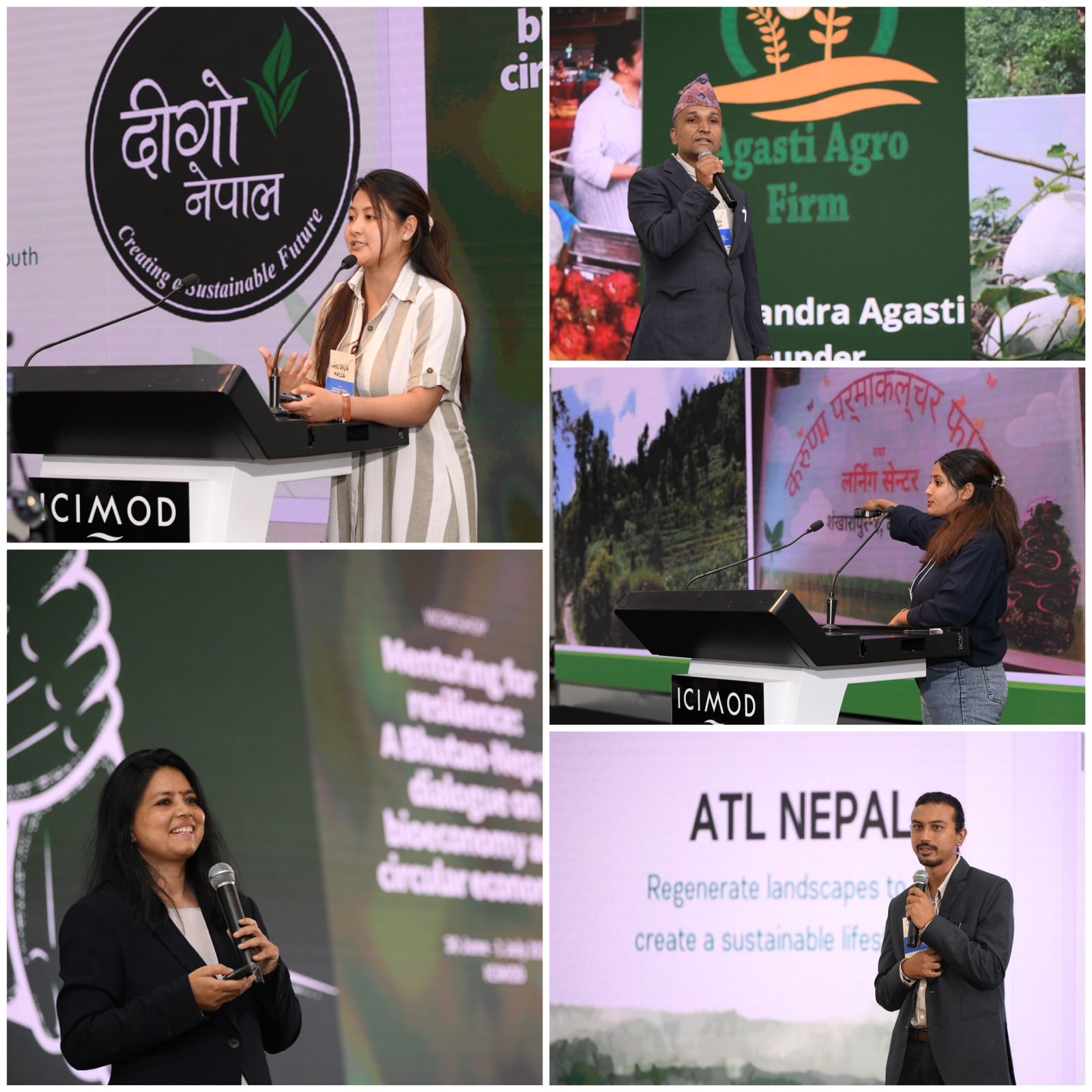
(In photo: Ms. Anjana Malla-Deego Nepal, Ms. Sujata Shrestha-Sakal BioEnzyme, Mr. Ramchandra Agasti-Agasti Agro Firm; Ms. Sirjana Lamichhane-Karuna Permaculture Farm; Mr. Aakash Silpakar-ATL Nepal)
Photo Credit: Rajendra Shakya
Across the board, the entrepreneurs reflected on how the incubation program helped unlock critical early-stage support — including R&D funding, access to skills, and networking opportunities — enabling them to grow ideas into impactful enterprises. Their ventures, deeply rooted in sustainability, are not only addressing ecological challenges but also creating livelihoods and strengthening local economies. The collective message was clear: investing in green, homegrown enterprises is a shared responsibility, and a greener, more inclusive future is already taking shape.
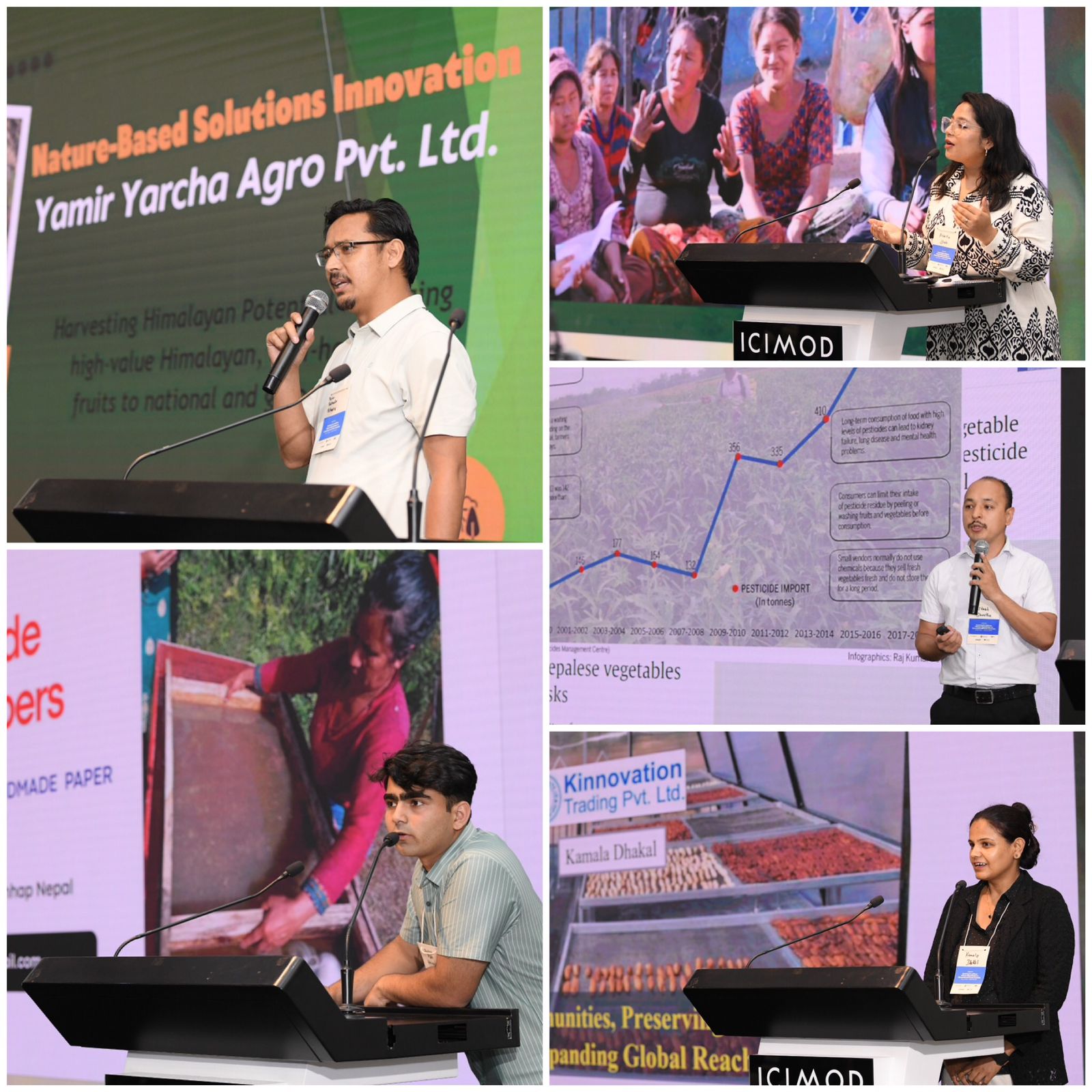
(In photo: Mr. Prem Bahadur Bohara-Yamir Yarcha Agro; Mr. Pushparam Ghimire-Pushpanjali Handmade Paper Industry; Ms. Ankita Shah-Agra Industries; Mr. Mitesh Shrestha-Yarsa Agro Research; Ms. Kamala Dhakal-Kinnovation Trading)
Photo Credit: Rajendra Shakya
The 10 entrepreneurs from the NbS Innovation Challenge who shared their stories were:
– Ankita Shah – Agra Industries
– Aakash Silpakar – ATL Nepal
– Anjana Malla – Deego Nepal
– Mitesh Shrestha – Yarsa Agro Research
– Sujata Shrestha – Sakal BioEnzyme
– Ramchandra Agasti – Agasti Agro Firm
– Kamala Dhakal – Kinnovation Trading
– Pushparam Ghimire – Pushpanjali Handmade Paper Industry
– Sirjana Lamichhane – Karuna Permaculture Farm
– Prem Bahadur Bohara – Yamir Yarcha Agro
Their stories served as powerful reminders that people, profit, and planet are not opposing forces — but interconnected pillars of the future we must build together.
In a special feature segment, four trailblazing leaders from Bhutan and Nepal took the stage to share their entrepreneurial journeys and the impact models behind their ventures. Through their compelling stories, the session offered valuable insights into brand building, community engagement, and strategic scaling. The speakers included Mr. Khilendra Gurung of HBTL, Dr. Prativa Pandey of Herveda Botanicals, Mr. Mani Niraula from the National Biodiveristy Center Bhutan, and Mr. Sonam Chophel of Druksell Bhutan – each bringing a unique perspective on harnessing local resources and innovation for sustainable growth.
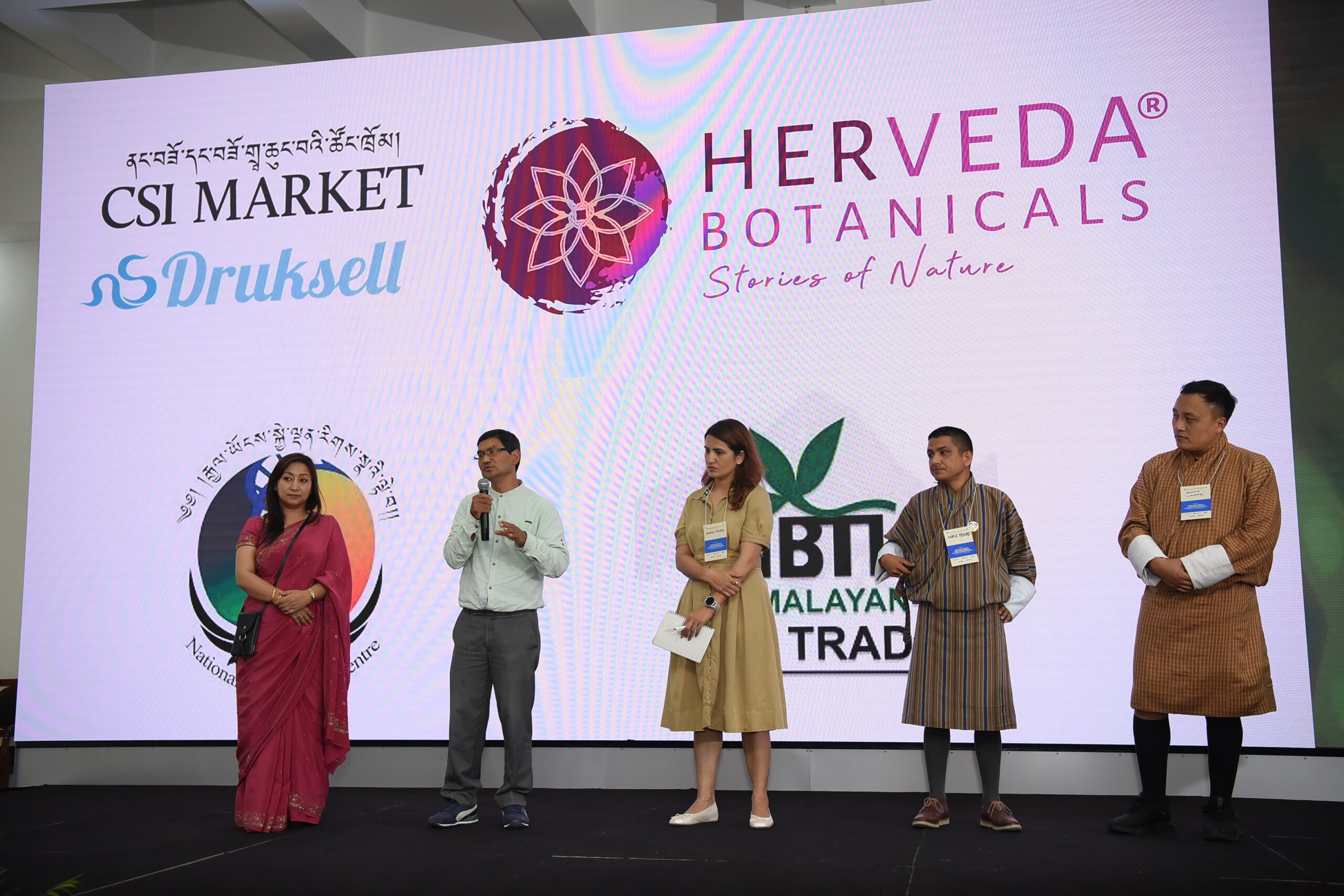
(In photo: left to right – Ms. Anu Joshi Shrestha-ICIMOD, Mr. Khilendra Gurung-HBTL; Dr. Prativa Pandey-Herveda Botanicals; Mr. Mani Niraula-NBC Bhutan; Mr. Sonam Chophel-Druksell Bhutan)
Photo Credit: Rajendra Shakya
What’s Next: Scaling Impact Through New Cohorts
Building on the success of the first NbS Innovation Challenge, the journey continues. The Industrial Enterprise Development Institute (IEDI) is set to implement two new cohorts of the Nature-Based Solutions Innovation Challenge — one in Kathmandu and the other in Surkhet. These upcoming cohorts will once again be funded by ICIMOD and receive technical support from KGS Inc. and Briddhi, ensuring a strong foundation of mentorship, incubation, and innovation.
A key focus of the new program cycles will be on bioprospecting-based businesses, with special attention to the Medicinal and Aromatic Plants (MAPs) sector. This is an exciting opportunity to unlock the economic and ecological potential of Nepal’s rich biodiversity, while promoting sustainable harvesting, indigenous knowledge systems, and green enterprise development. The new chapters of this challenge aim to go deeper — nurturing entrepreneurs who not only grow businesses, but also grow impact where it matters most.
Share this Story
Photo gallery
